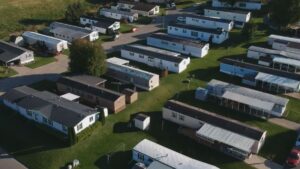By Ashley Davis

The phrase “manufactured home” gives people pause; the recent shift away from the terms “mobile home” or even “trailer” was not one that the majority of the public was aware of. However, this change indicates a wider shift in the attitudes and legislative landscape towards manufactured home communities. Following a series of 1976 regulations, the quality of manufactured homes dramatically increased. (In fact, they are no longer truly mobile. It is expensive and difficult to transport a manufactured home to a new location and thus not often done.)[1] Manufactured homes are much more durable and of a higher quality than their pre-1976 counterparts and are an affordable option for lower income individuals who are still interested in pursuing homeownership.[2] Manufactured home tenants generally either own their home and pay a lot rental fee to the owner of the park, or pay both rent for the home and park fee. The other possibility, and the one that will be focused on here, is when tenants have a rent-to-own contract, which allows them to pay monthly rent along with an additional fee that will eventually result in homeownership after a set period of time, usually 5 years.[3]
The problem with this policy is that in Virginia, if the tenant is evicted before the set period is up, there is no way for the tenant to recoup the money they have put towards homeownership. One of two things tend to happen in situations such as this: (1) due to the tenant’s unstable financial condition, they are unable to afford both monthly rent and the payments towards ownership or (2) the manufactured home’s owner finds an excuse to evict tenants before the tenant’s home is fully paid off so that the owner can keep both the manufactured home and the tenant’s payments [4]. Manufactured home tenants in Virginia may only be evicted for a specific reason, but landlords often stretch the terms of these categories to their limits to find any excuse for eviction.[5]
This is not to say that there are no advantages to rent-to-own leases; they can pave the way towards homeownership for manufactured home tenants.[6] These incremental steps towards owning their home can feel easier to navigate than mortgages and bank loans, but unfortunately the prevalence of predatory practices means that instead of an opportunity for accessibility, these leases mainly exist to take advantage of low-income residents. One proposed solution to this is closer government oversight of rent-to-own programs to help lower income families take steps towards homeownership.[7] However, with no current movement towards preventing this practice, it is highly unlikely that Virginia will do this any time soon. The other alternative is resident-owned parks, which would allow for tenants to work together to eventually pay off their homes.[8] This path seems more viable than legislative action, and though advocacy work is being done, this future is still a long way off.
[1] Manufactured Home Community Coalition of Virginia, An Assessment of Central Virginia’s Manufactured Housing Communities at 6 (Nov. 2016) https://mhccv.org/wp-content/uploads/2017/08/mhccv_centralva_report.pdf.
[2] Manufactured Home Community Coalition of Virginia, An Assessment of Central Virginia’s Manufactured Housing Communities at 7 (Nov. 2016) https://mhccv.org/wp-content/uploads/2017/08/mhccv_centralva_report.pdf.
[3] Katherine MacTavish et al, Policy and Practitioner Perspective: Housing Vulnerability Among Rural Trailer-Park Households, 13 Geo J. Poverty L. & Pol’y 95, 101.
[4] Katherine MacTavish et al, Policy and Practitioner Perspective: Housing Vulnerability Among Rural Trailer-Park Households, 13 Geo J. Poverty L. & Pol’y 95, 101.
[5] Va. Code Ann. § 55.1-1315 (2019)
[6] Andrea J. Boyack, Sustainable Affordable Housing, 50 Ariz. State L. J. 455, 491.
[7] Andrea J. Boyack, Sustainable Affordable Housing, 50 Ariz. State L. J. 455, 491.
[8] Manufactured Home Community Coalition of Virginia, An Assessment of Central Virginia’s Manufactured Housing Communities at 41 (Nov. 2016) https://mhccv.org/wp-content/uploads/2017/08/mhccv_centralva_report.pdf.

